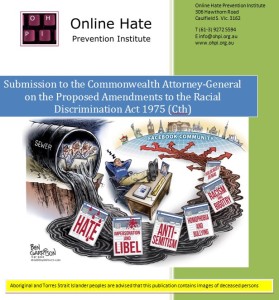 In a submission to the Australian Government’s consultation on proposed changes to Australia’s Racial Discrimination Act the Online Hate Prevention Institute (OHPI) has warned of serious and unforseen consequences if the proposed changes go ahead.Public sentiment is also against any changes to the Act with community groups of all types united against the proposed changes and some Government MPs threatening to cross the floor if it is brought to a vote. Cyber-racism, accounted for over 40% of all racism related complaints made to the Australian’s Government’s Human Rights Commission last year. The changes being proposed would impact on Australia’s ability to determine what sort of online content should be blocked by social media companies when viewed from Australia.
In a submission to the Australian Government’s consultation on proposed changes to Australia’s Racial Discrimination Act the Online Hate Prevention Institute (OHPI) has warned of serious and unforseen consequences if the proposed changes go ahead.Public sentiment is also against any changes to the Act with community groups of all types united against the proposed changes and some Government MPs threatening to cross the floor if it is brought to a vote. Cyber-racism, accounted for over 40% of all racism related complaints made to the Australian’s Government’s Human Rights Commission last year. The changes being proposed would impact on Australia’s ability to determine what sort of online content should be blocked by social media companies when viewed from Australia.
Major social media companies do block content by country, but only when the content is actually unlawful – such as the promotion of Holocaust denial in Germany and some other countries. The proposed changes to Australian law would result in online racism no longer being unlawful, which could, OHPI warned, result in a flood of hate.
The Online Hate Prevention Institute is available online at: https://ohpi.org.au/ohpi-
The submission raises the following key points:
- S 18C plays an important role against Cyber-Racism
- Without S 18C, Australia loses it’s ability to define for itself what is and is not permitted on platforms like Facebook when viewed from Australia.
- Country blocks on content require there to be a local (i.e. Australian) law which makes the content unlawful – the proposed changes remove this
- The proposed changes would give a blanket exemption to all racism in social media
- The change would remove a diversionary path which sees online racism resolved through reconciliation and would instead leave complaints up to telecommunications law and the criminal justice system
- There is a risk of a flood of previously blocked content coming back online if the law is changed
OHPI’s CEO, Dr Andre Oboler, has called for the problem of cyber-racism to be given greater consideration before any changes are considered further. “The rising tide of online hate puts the community at risk. Cyber-racism can impact on peoples mental health and can lead to substance abuse, self harm and suicide. It can also tear the fabric of society apart and incite race riots and violence. It is only by making such content unlawful that countries like Australia can determine for themselves, through the courts if needed, what social media companies should or should not block in their jurisdiction. The alternative is letting private companies with vested interest set the rules, and we know that system simply isn’t working and is putting the public at risk. The fundamental role of government is protecting public safety and tampering with laws that have worked for decades, and continue to work well in a rapidly changing world, is not the way to achieve that.”
